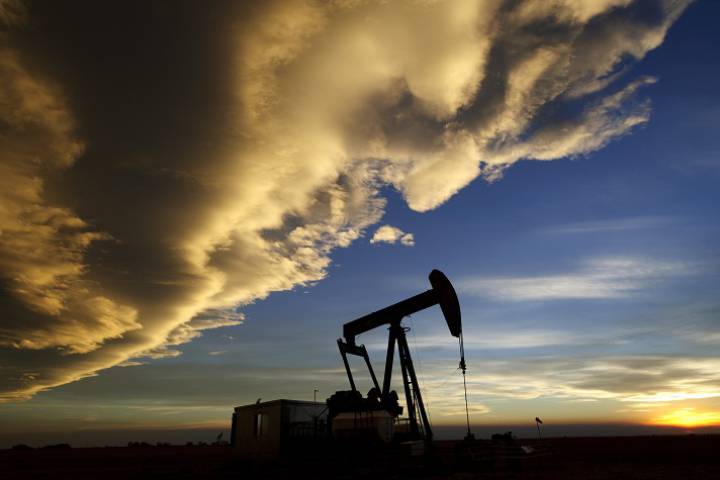For years, Canada hasn’t had much reason to cheer news about oil prices.

The price of oil took a big hit starting in 2014, with West Texas Intermediate (WTI) going from $112 per barrel to $62 per barrel amid production that was exceeding demand.
Coverage of oil prices on Globalnews.ca:
Plenty has changed in three and a half years.
Oil prices are rallying enough that the provinces that depend on the resource could reap a windfall — and a slumping Canadian dollar isn’t hurting, either.
That’s according to an analysis released by BMO senior economist Robert Kavcic on Thursday.
In it, he said Alberta alone could reap a financial windfall of as much as $3 billion for the 2018/19 fiscal year.
Saskatchewan and Newfoundland and Labrador wouldn’t fare too shabbily, either, he noted.
READ MORE: Oil prices are high. So why is the Canadian dollar so low?
Kavcic calculated the financial upside for all three provinces by looking at the price of WTI oil, its spread with Western Canadian Select (WCS) — a blend of bitumen, synthetic crude, diluent and conventional oil — and the price of the Canadian dollar against the U.S. dollar.
In doing this, he noted that Alberta sees an impact of $265 million on its deficit for every $1 change in the price of WTI; according to one academic, it can also see an impact of $198 million for each change of $0.01 in the exchange rate.

Get daily National news
Saskatchewan’s financial impact is $16 million and Newfoundland and Labrador’s is $23 million for every $1 of change in the price of Brent crude.
Taking these metrics, Kavcic estimated that Alberta could see revenue of $3 billion, equivalent to 1.2 per cent of its economy, in 2018/19.
But even that doesn’t fully account for the money Alberta could make with oil prices where they are.
Coverted to Canadian currency, the price of WTI “recently pushed near $100, effectively back into the range seen before the oil price shock.”
And the provincial government’s take increases when the price of WTI moves into the $60 to $120 range.
“As a result, the [financial impact from] oil prices has likely increased since Budget 2018, providing additional upside,” Kavcic wrote.
There could be a catch, however — a boost in oil prices could be offset by a shutdown in production at Syncrude’s oilsands mine and upgrader facility, as well as any decision by the provincial government to hike program spending within the fiscal year.
Saskatchewan, meanwhile, could see a financial upside of $220 million, equivalent to 0.3 per cent of it economy — and that could help to chip away at the province’s $365-million budget deficit.
For Newfoundland and Labrador, there could be a financial upside of $235 million, equivalent to 0.7 per cent of its GDP.
That would be welcome news in a province that has a deficit equivalent to over two per cent of its GDP ($683 million) and that has undergone a range of measures to balance the books, including tax hikes, increasing fees and introducing a deficit reduction levy.
The latest trends in oil prices and the Canadian dollar could help Newfoundland and Labrador slash its deficit by as much as a third, Kavcic wrote.
READ MORE: Facing $1.8B deficit, Newfoundland and Labrador passes controversial budget
The numbers looked about right to Trevor Tombe, an economics professor at the University of Calgary.
He noted that the Alberta government budgeted on the assumption that WTI prices would be about $59 per barrel; it was trading above $70 on Friday.
But just how much could this money help Alberta’s financial situation — such as its $8.8-billion budget deficit?
“I think we should consider any unexpected windfalls as coming right off the deficit,” Tombe told Global News.
“If the deficit can be brought to a smaller level for next year, that would be what I expect the government to do.”
Tombe couldn’t say how long these trends were likely to hold up — no one can, he noted — but he said futures prices suggested that people believe WTI could fall from $70 to $63 at this time next year.
“That’s about a 1-0 per cent drop expected by the markets,” he said.
“Of course, whether that pans out or not, who knows, but these are individuals putting their money where their mouths are.”
Alberta’s government forecasts its budget to hit balanced territory around the 2023/24 fiscal year.
As part of that projection, Alberta expects prices to hit $73 per barrel by that time, “which is not overly aggressive,” Tombe said.
“It does show that currently, anyone’s plan to balance does rely on royalty revenues,” he added.
- With files from Erica Alini and The Canadian Press
















Comments